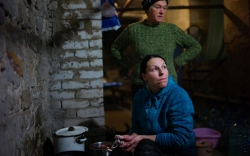







As humanitarian aid dwindles and winter approaches, the residents of the Donetsk People’s Republic struggle to carry on
The latest initiative to enforce a rapidly disintegrating cease-fire in eastern Ukraine was blown out of the headlines Thursday when an apparently errant mortar shell struck a civilian bus in the eastern city of Donetsk, killing up to 10 people. Russian-backed separatists and Ukrainian forces have traded accusations for the incident, which took place the same day the rebels claimed to capture the city’s international airport following the fiercest fighting the country has seen in months.
The timing of the latest flare-up, part of a weeks-long surge in violence in eastern Ukraine, is especially unfortunate. Preliminary peace talks underway in Berlin this week had shown signs of early progress, with the announcement Wednesday night that Kiev and Moscow had agreed to implement a “demarcation line” from which heavy weapons could start withdrawing.
The very real prospect of a return to full-scale war could throw this tentative diplomatic progress into jeopardy. The buffer zone agreed to on Wednesday would be moot if the wider cease-fire, agreed to in Minsk in September, were to fully collapse.
On Wednesday, U.S. Secretary of State John Kerry held out hope the cease-fire could be restored. He told reporters in Washington that honoring the Minsk agreement was "critical to our ability to be able to restore the full sovereignty and the calm and the stability necessary for a transformation," as he pinned blame for the violence squarely on Russia and its separatist proxies.
But most analysts say that argument is wearing ever more thin. According to Stefan Meister, an expert on Russia and Eastern Europe at the German Council on Foreign Relations, "War is coming back in a much more serious way." Western leaders wrangling for a solution to Ukraine's separatist crisis are in denial, “because they have nothing else,” Meister said. “The Minsk agreement is the only chance they have to stop the violence.”
Meanwhile, rhetoric is escalating on both sides of the conflict. Speaking at the World Economic Forum in Davos on Wednesday, Ukrainian President Petro Poroshenko said Moscow had sent 9,000 troops to Ukraine since the conflict began. He showed the audience a yellow, bullet-riddled piece of sheet metal that Poroshenko said belonged to a civilian bus struck by pro-Russian separatists in a previous shelling last week. Thirteen were killed in that attack.
Russia, which has consistently denied Western allegations that it has sent tanks and thousands of unmarked Russian troops into Ukraine, has instead left it up to Kiev to end its “counter-terror” operations against the separatists before diplomatic progress can be made.
One possible explanation for why both sides have adopted a more aggressive bearing in recent days is it that they are trying to improve their bargaining position as talks proceed. If all goes according to plan, negotiations in Berlin would lead to final peace talks in Astana, Kazakhstan — though that meeting has already been postponed once. “But the probability is that they may lose control of the spiraling escalation,” Meister added. “The reality is that it’s getting more and more difficult to stop this war.”
Still, the West has reason to believe the time for productive peace talks has finally come. After nine months and 4,700 lives lost, both sides of the conflict are increasingly depleted of resources and resolve. Most importantly, as far as the West is concerned, Russia's economy has been gutted by plummeting oil prices and biting Western sanctions imposed over the Ukraine crisis.
At the same time, analysts say Russian President Vladimir Putin is unlikely to back down in Ukraine without something to show for his gamble. The confrontation with the West, which Putin has framed as a nationalistic defense against Western encroachment in Russia’s backyard, has sent his domestic popularity soaring. And Putin knows there is little chance the U.S. or its European allies are willing to risk a military confrontation with Russia over a country of limited strategic value to the West. Europe, meanwhile, is growing weary of the strained ties with Moscow, an important trade and energy partner.
Many analysts argue that Putin still envisions a “frozen conflict,” whereby the separatist east effectively counters Kiev’s current momentum westward. He has also demanded guarantees that Ukraine will not be welcomed into Western alliances such as NATO and the EU, which Kiev has made overtures towards in recent months.
But Meister said the rising violence and influx of Russian military aid into the east does not seem to portend the realization of Kiev’s worst fears: that Russia might end the standoff for good by invading. “My impression is that the Russians already have what they want — a tool to influence Ukrainian policy in Kiev, and to use in bargaining with the West on bigger energy and security issues,” he said. "Invading the rest of Ukraine would be too costly."
Russia favors EU compromise, but Washington'’s intransigence is getting in the way
Unclear who is responsible for strike on bus stop in Donetsk that killed seven people
Negotiators in Belarus reach impasse as rebels and Kiev try to reach cease-fire deal
Error
Sorry, your comment was not saved due to a technical problem. Please try again later or using a different browser.